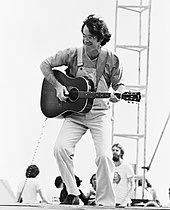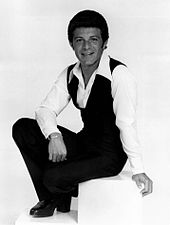
In 1976, Billboard magazine published a chart ranking the top-performing songs in the United States in the easy listening market. The chart, which in 1976 was entitled Easy Listening, has undergone various name changes and has been published under the title Adult Contemporary since 1996. [1] In 1976, 40 singles topped the chart, then published under the title Easy Listening. Through the issue of Billboard dated February 14, the header of the chart stated that it listed "best-selling middle-of-the-road singles compiled from national retail sales and radio station airplay". With effect from the following week's issue, the reference to retail sales was removed and the header stated that the chart was based on radio airplay only. [2] [3]
Contents
Captain & Tennille, John Denver and Olivia Newton-John tied for the most number-one singles in 1976, each achieving three chart-toppers. Captain & Tennille's total of six weeks at number one was the most by any act, and the duo's song "Muskrat Love" had the highest number of weeks at number one by a single, spending four non-consecutive weeks in the top spot; no song spent more than two consecutive weeks at number one during the year. The husband-and-wife duo Captain & Tennille were at the peak of their success in 1976, reaching the top 10 of Billboard's pop chart, the Hot 100, with three singles, extending their run of consecutive Easy Listening number ones to five, and hosting their own variety show on the ABC television network. Their career would go into decline shortly afterwards, however, and they would achieve no further Easy Listening chart-toppers. [4] [5]
A number of Easy Listening number ones of 1976 also topped the Hot 100 including "50 Ways to Leave Your Lover" by Paul Simon and John Sebastian's "Welcome Back", [6] the theme from the television show "Welcome Back, Kotter". [7] "Silly Love Songs" by Wings and "Don't Go Breaking My Heart" by Elton John and Kiki Dee topped both charts and were named the top two songs in Billboard's year-end chart of pop singles, although the magazine noted that the soft sounds which had been popular on pop music radio in recent years were beginning to be displaced by the "funkier" sounds of disco and soul. [6] [8] Frankie Avalon was one artist who embraced the increasingly-popular disco style but still received sufficient plays on relevant radio stations to top the Easy Listening chart, as he reached number one with a disco-influenced re-recording of his own 1959 hit "Venus". [9] The final Easy Listening number one of the year was "Torn Between Two Lovers" by Mary MacGregor, which would go on to top the Hot 100 early the following year. [6]






